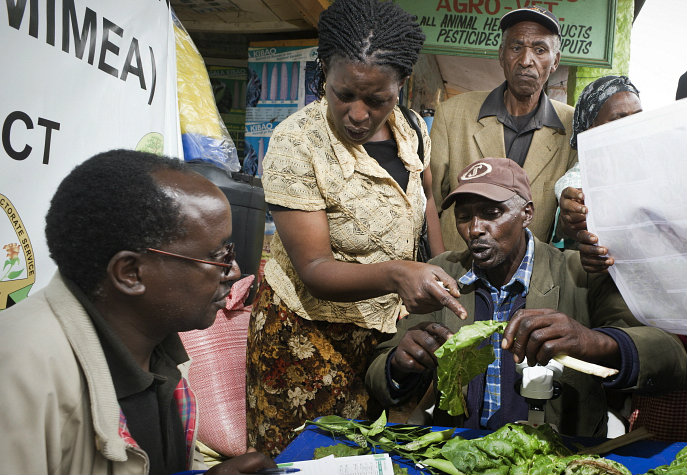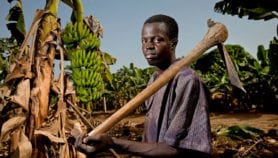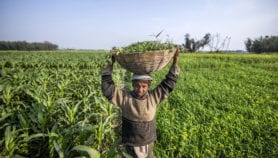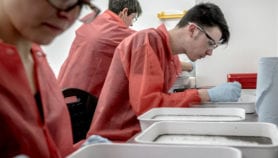By: Aamna Mohdin
Send to a friend
The details you provide on this page will not be used to send unsolicited email, and will not be sold to a 3rd party. See privacy policy.
Opportunities to enhance crop yields and reduce poverty in Africa are being lost because of a “polarised public debate” on the continent, according to a report released this week (21 July) by international policy institute Chatham House.
Genetic modification (GM) research projects remain stuck at the field trial stage due to governments’ fears keeping the technology from African farmers, it says.
This “deadlock” of continual field trials has allowed African governments to appease both sides of the GM debate: proponents are pleased research is done, whereas opponents are satisfied that research has not led to products on the market, the report says.
“Part of the problem is that it is a very one-sided debate. Governments are not doing a good job of providing reliable information and data that contradicts the misinformation campaigns about GM. Politicians and policymakers are wary of stepping into the debate,” says author Rob Bailey, from Chatham House.
The report cites evidence from a survey of ongoing GM research and development projects in selected African countries by networking organisation the Forum for Agricultural Research in Africa: from 2010 to 2013 none of the surveyed projects had progressed from field trials.
“Many of the opponents of GM crops are not interested in engagement or understanding. They want to eliminate the technology altogether,” says Calestous Juma, an international development expert at Harvard Kennedy School, United States.
“This is why the highly restrictive laws were put in place [in Africa] before the technology was given a chance or before there was sufficient evidence either way. It is also the reason why some of the opponents destroy field trials,” he says. “It is because they do not want to see any evidence that might lead to the adoption of the technology. They have made up their minds that biotechnology should be eliminated. The situation is more like war than it is like debate.”
In many African countries, the report says, governments face political damage for being perceived to be too pro-GM. Policymakers are reluctant to release biotechnologies due to fears of media campaigns or a backlash from civil society, it adds.
Agricultural development in Africa has a set of complex challenges with incredibly high stakes, the report says. Low soil fertility, weak land-tenure systems and a lack of access to finance among other things, have hampered development efforts, and climate change is set to make things worse.
But GM and biotechnology have not been allowed to contribute much towards helping fix these issues in Africa, the report says.
“Africa cannot afford to lose sight of the opportunity GM crops offer for feeding its people,” says Margaret Karembu, the director of ISAAA (the International Service for the Acquisition of Agri-Biotech Applications) AfriCenter, one of the three regional centres run by the knowledge transfer network.
“The risks of not adopting GM crops in Africa are much higher than [those on] other continents. One fundamental — and perhaps the most important — difference is the fact that Africa, unlike Europe or America, is faced by chronic food insecurity and malnutrition.”
Those interviewed in the report, including policymakers, scientists and farmers, argued that the “prohibitive politics of biotechnology in Africa are largely rooted in Europe” as the absence of a European consumer market for GM has discouraged African farmers, and NGOs campaigning against GM in Africa often have European links through affiliation or funding relationships.
But Liz Hosken, the director of The Gaia Foundation, a UK-based NGO that seeks to protect cultural and biological diversity, says these claims are “deeply insulting” to Africans and rooted in “patriarchal … thinking”.
“Farmers and consumers do not want to be held to ransom by corporations who want to control whole seed markets and therefore decide what we eat,” Hosken says.
Rose Williams, director of Biowatch South Africa, whose main aim is to stop biological diversity from being privatised for corporate gain, says the report contains pro-GM biased misinformation. According to Williams, the field trials the report lists are mostly superfluous.
“Nearly all the traits they hope to achieve using GM technology already exist or can be developed using non-GM breeding methods,” says Rose.
“Pro-GM researchers and policymakers must live in fear of being found out for their exaggerated claims in support of GM crops, and their unfounded denigration of the legitimate concerns of critical consumers and anti-GM activist groups.”
The report also recommends a united approach to biosafety across Africa, which could increase regulatory coherence between countries.
The most important improvements needed, the report notes, are engaging farmers in research to understand their needs and making sure this research translates into impact.
> Link to On trial: Agricultural biotechnology in Africa
> Link to SciDev.Net’s GM debate














